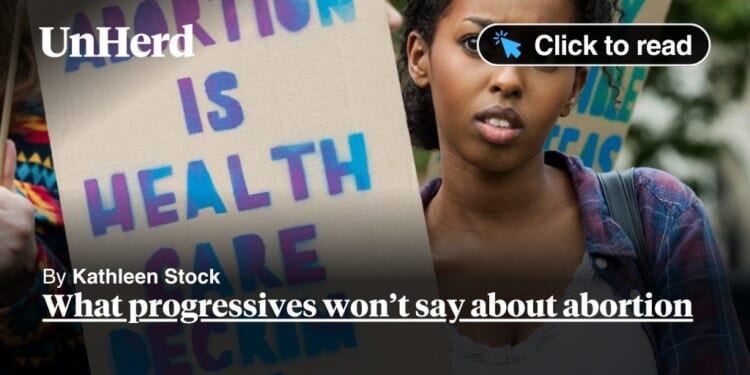This may seem a strange question, but what exactly is wrong with terminating the lives of female foetuses, simply because they are female? The official progressive line is that where an abortion is wanted, it should be facilitated wherever possible; that personal reasons for doing it should not be challenged by the state. Yet when a Scottish Government-commissioned report was released last week, arguing that a blind eye should be turned to sex-selective terminations, there was general consternation.
Or here is another puzzle. Why does the British Pregnancy Advisory Service — the UK’s main abortion provider, and uncompromising in its mission to facilitate women’s reproductive choices, whatever they are — explain on its website that their clients may take “pregnancy remains” away afterwards for a “private service, burial or cremation”? Why might anyone want to do such a thing?
It is easy enough to arrive at the answers to these questions in your head, provided you don’t have to say them out loud. The first says: ending the lives of foetuses simply because they are female is nowhere near good enough a justification for such a momentous action. Abortions should only be done for a highly restricted set of reasons. They should not be just nodded through for any reason a pregnant woman likes.
And the second says: a woman might want to have a private service or burial afterwards for her foetus, because she recognises that her decision helped to cause the death of her child — or of her potential child, if you prefer. Either way, she may well be grieving the loss.
Underpinning each of these answers are further facts, equally difficult to spell out in polite society. A life is deliberately ended during the abortion process, whatever else is saved or enabled. Deliberately causing death is a morally serious matter, deserving deep consideration and adequate justification. For some, it is tempting to picture any pregnant adult woman contemplating this as in an unsought, perhaps even coerced situation, with no real responsibility for the outcome. But in a society that contains sex education, consensual relationships, free contraception, and the morning-after pill in pharmacies, this is just not true for many.
Putting things like this does not mean that abortion must be wrong. In a fraught situation with no winners, even the right decision can produce awful outcomes. Sometimes life forces you to opt, very reluctantly, for the least worst thing rather than the best.
But thanks to the hegemonic, sanitised account of abortion circulated by influential medical and feminist organisations, this difficult conversation is not even available. Instead, enormous efforts are made to make the decision sound no more important than choosing to get a haircut, or opting to let it grow out. On this view, as summed up in the new Scottish report, “women should have the right to their own reproductive choices and are best placed to make pregnancy decisions based on their personal circumstances”. It’s just healthcare, after all — or so the experts keep insisting — and the fact that the health of the occupant in the womb is not obviously improved by the process is neither here nor there.
From the bland starting point of these people, it would be weirdly arbitrary to oppose women having abortions on sex-selective grounds. Why shouldn’t they have one for any reason they like, since the action is essentially trivial anyway? So morally negligible is the process supposed to be, that for years several Royal Colleges have been arguing it should be fully decriminalised, even up to full-term. In June this year, the House of Commons agreed.
During parliamentary debate at the time, ethical concern was mainly reserved for pregnant women who had illegal late-term abortions at home, and who then faced the supposedly cruel threat of prosecution afterwards. Implicit was the idea that such women could only have done harm to their own health, and not to anyone else’s; and hence that there was no need for any law to punish them, nor to deter future others from doing the same.
And now a Scottish “expert group” is arguing not just for decriminalisation, but for a significant relaxation of current medical requirements too. Up to 24 weeks, you should be able to abort for any reason you like — including “because it’s a girl”, or indeed “because it’s a boy”. Post-24 weeks, current regulations restrict abortion to cases where the baby or mother’s life or health is gravely threatened; but the authors say that this too should be changed.
According to their recommendations, two “appropriately trained registered healthcare professionals” — not necessarily doctors — should now decide whether a post-24 weeks abortion is “appropriate”, vaguely taking relevant circumstances into account. Unspoken here is the fact that “appropriately trained” assessors will not be able to rule any such decision out; for on what grounds could they, or their trainers, object? It has already been conceded that abortion is a decision only relevant to the woman concerned. She is simply exercising her autonomy, with no downsides for anyone else important.
It is not that this conspiracy of silence is badly motivated. Indeed, perversely, the staunch commitment to maintaining levels of denial pays secret tribute to the weightiness of the decision, coupled with the knowledge that so many women have already made that choice. There is a lot of guilt, shame, regret; not for everyone but certainly for some, albeit that most therapists will not openly acknowledge it either. In a spirit of sisterhood there is an urge not just to keep away from a painful place, but to try and make it less painful by positive reframing. Other women will try to make you feel better about a terrible haircut. Of course they are going to do it here too.
Signs of the desire to avoid reality are everywhere in the Scottish report. As usual with these things, there is a fussy focus on language. At one point, the sex of pregnant women is referred to as “assigned at birth”, technically making sex-selective abortion impossible anyway. Abortion is — to repeat — just a matter of receiving “healthcare”, a domain which suddenly and conveniently has no ethical dimensions whatsoever.
There is also a lot of cherry-picking, camouflaged in technocratic language. International “best practice” on abortion should be followed, we are told, except when it comes to endorsing the more conservative gestational age limits common in Europe. The concerns of dissenting “stakeholders” worried about existing age limits are waved away. Any attempt to bring the question back to morality is placed out of bounds: “the moral status” of the foetus, we are told, “fell outwith the scope of the review”.
In this way, the authors pretend to themselves they are not doing ethics, when quite obviously they have already taken a view. Admittedly, it is historically a complicated subject. Over the past few decades, there has been much philosophical discussion of whether foetuses count as babies, or human beings, or persons in their own right. It seems to me that, at least by the time we are urgently resuscitating their identically aged peers in neonatal intensive care units, they are clearly all three.
But even if younger, non-viable foetuses were only a kind of pre-human animal — animate and perhaps sentient, but otherwise unfortunately deficient in the personhood stakes — they should surely still be of some moral concern. They would not therefore be nothing. As a society, we care a lot about animals, and disapprove of harming them for no good reason. Why not here too?
“But even if younger, non-viable foetuses were only a kind of pre-human animal, they should surely still be of some moral concern”
I know how these conversations tend to go. Along with anger at the heresy — not to mention irrelevant comparisons to draconian US regimes — there will likely be deference paid to the supposed real-life judgements of actual women. People don’t tend to get an abortion lightly, I will be told. Actually, I know that is not always true. But to the extent that it is, it can only confirm my basic point: unlike many of those professionally interested in the subject, others understand that there is a weighty decision to be made about a prospective death, and not every motivation is a good one. The state putting limits on unacceptable decision-making is therefore as it should be. This is not the same as a “ban”.
It will take courage to talk openly about the social and personal losses of abortion, as well as the gains. Doing so need not entail placing unhelpful blame or stigma on woman who have had one (or two, or three); nor upon the medics who carried it out. It is clear that a well-oiled system, governed by a code of silence towards half of the story, has colluded to produce present behaviour. But unless someone challenges the vision, we are not so much faced with a slippery slope as an utterly frictionless one.
The numbers are leaping up annually — perhaps fuelled by the continuation of the pills-by-post scheme, first instigated during Covid and then kept on. We already have highly permissive rules, and yet they keep being challenged by people with simple-minded fixations, who show no signs of wanting to slow things down.
In order to complain about this respectably, you are not supposed to approach directly, but have to find some circuitous route: to talk hyperbolically about the evils of sex-selection, or about the dire spectre of population decline. You can’t mention the most obvious ethical difficulty: hundreds and thousands of deaths. By all means, let’s talk about the effects of abortion on adults. But – if we have to use mindless bureaucratic language – let’s not pretend that there aren’t other stakeholders here too.

















